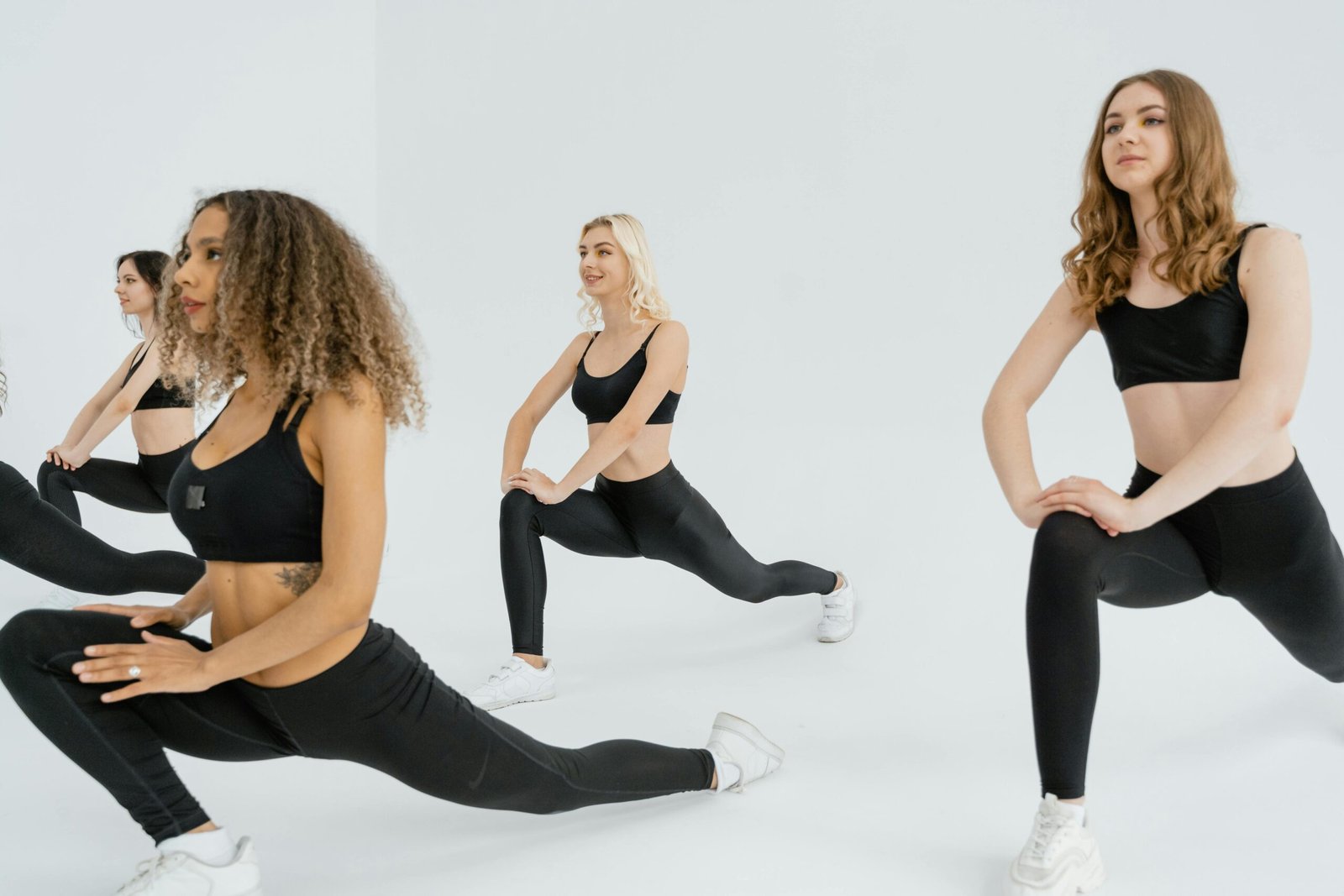How Can Regular Exercise Improve Your Physical Health?
A vibrant scene depicting a diverse group of individuals engaging in various forms of exercise in a lush park setting, showcasing activities like running, yoga, cycling, and strength training, with an emphasis on joyful expressions and dynamic movement, surrounded by green trees and blooming flowers under a bright blue sky.
Regular exercise is key to a healthy life. It boosts your physical health and overall well-being. It makes your heart stronger, builds muscle, and helps keep your weight in check.
It also cuts down the risk of serious diseases like diabetes and heart disease.
Being physically active is not just about looking good. It’s about feeling good too. It increases your energy, improves flexibility, and sharpens your mind. By adding physical activity to your daily routine, you can live a healthier, more active life.
Key Takeaways
- Regular exercise strengthens the heart and improves cardiovascular health.
- It helps build muscle mass and increases overall strength.
- Physical activity supports weight management and reduces obesity risks.
- Exercise lowers the risk of chronic diseases like diabetes and heart disease.
- It enhances energy levels, flexibility, and mental well-being.
Understanding Regular Exercise and Physical Health
Regular exercise is key to keeping your body healthy. It’s important to know what regular exercise is and what physical health means. A good workout routine can boost your fitness benefits, like better heart health and stronger muscles.
Regular exercise means doing physical activities often, like walking, jogging, or lifting weights. Physical health covers many areas, like heart health, muscle strength, flexibility, and body shape. Exercise deeply affects almost every part of our body.
Defining Regular Exercise
Knowing what regular exercise is helps us see its health benefits. You can get regular exercise in many ways, including:
- Cardiovascular exercises, such as running or swimming
- Strength training exercises, such as weightlifting or resistance band exercises
- Flexibility exercises, such as yoga or Pilates
Components of Physical Health
Physical health includes several key areas, like:
- Cardiovascular health
- Muscular strength and endurance
- Flexibility
- Body composition
Adding a workout routine to your day can bring many fitness benefits. It can make you healthier and happier. Regular exercise can lower the risk of serious diseases and improve your mood.
Cardiovascular Benefits of Active Living
Regular physical activity is great for your heart. It makes your heart stronger and more efficient. This can lower your blood pressure and reduce heart disease risk.
Exercise isn’t just good for your heart. It also helps keep your weight healthy, boosts your mood, and strengthens your immune system. Some main benefits include:
- Improved circulation and oxygen transport
- Reduced risk of chronic diseases
- Enhanced overall quality of life
Adding physical activity to your daily life can greatly improve your health. It doesn’t matter if you like walking, running, or something else. Just find what you enjoy and keep doing it.
Building Strength and Muscle Mass
Regular exercise is key for building strength and muscle. Resistance training is a top way to do this. It uses weights, bands, or your body to work muscles. This can lead to better muscle strength and a faster metabolism.
To start with resistance training, knowing proper form is crucial. Here are some exercise tips to remember:
- Begin with weights you can handle and then increase the challenge
- Always focus on the right form to avoid injuries
- Try different exercises to work out various muscles
By using these exercise tips and adding resistance training to your routine, you’ll see big fitness benefits. Your health will also get a boost.
| Benefits of Resistance Training | Description |
|---|---|
| Improved Muscle Strength | Increased muscle mass and strength |
| Enhanced Metabolism | Higher resting metabolic rate, supporting weight loss and overall fitness |
| Bone Density Improvements | Reduced risk of osteoporosis and fractures |
Weight Management Through Regular Exercise
Regular exercise is key for managing weight. It burns calories during and after activity. This helps with losing and keeping weight off, which is vital for health.
By adding exercise to your life, you build muscle. This boosts your metabolism and helps with weight control.
Some main benefits of exercise for weight management are:
- Calorie burn during and after exercise
- Muscle mass building, which supports metabolism
- Appetite reduction and improved mood, making it easier to stick to a healthy diet
To manage weight well through exercise, pick activities you like and can keep up with. It could be walking, jogging, cycling, or swimming. The key is to find something you can do regularly.
By combining exercise with a healthy diet, you can keep a healthy weight. This improves your physical health and overall well-being.
Exercise is a big part of a healthy life. It does more than just help with weight. It makes life better in many ways. So, find something fun to do and make exercise a daily habit.
| Benefits of Regular Exercise | Impact on Weight Management |
|---|---|
| Calorie burn during and after exercise | Supports weight loss and maintenance |
| Muscle mass building | Supports metabolism and weight management |
| Appetite reduction and improved mood | Makes it easier to stick to a healthy diet |
Boosting Your Immune System with Physical Activity
Regular physical activity greatly improves our health. It boosts our immune system, helping us fight off illnesses. A good workout routine strengthens our body’s defenses. This reduces the chance of getting sick or developing diseases.
Exercise also lowers inflammation, which is linked to many chronic diseases. This is a major health benefit.
A workout routine with aerobic, resistance, and flexibility exercises is best. These types of exercises offer many health benefits.
- Reduced inflammation
- Improved immune function
- Enhanced recovery capabilities
- Lower risk of chronic diseases, such as heart disease and diabetes
Adding physical activity to our daily lives is key. It can be a walk, gym visit, or home workout. Every bit helps make our immune system stronger and healthier.
| Physical Activity | Health Benefits |
|---|---|
| Aerobic Exercise | Improved cardiovascular health, reduced inflammation |
| Resistance Training | Increased muscle mass, enhanced immune function |
| Flexibility Exercises | Improved range of motion, reduced risk of injury |
Impact on Sleep Quality and Energy Levels
Regular physical activity greatly improves sleep quality and energy. By adding fitness tips to your day, like listening to your body, you boost your health. This makes you feel better overall.
Some key benefits of exercise on sleep and energy are:
- Reduced stress and anxiety
- Regulated body temperature
- Release of sleep-promoting hormones
- Improved cardiovascular health
- Enhanced muscle strength and endurance
- Boosted metabolism
When you exercise, timing matters. Working out too close to bedtime can mess with sleep. It’s best to finish your workout a few hours before bed. This lets your body relax before sleep.
A vibrant scene of diverse individuals engaged in various physical activities such as jogging, cycling, and practicing yoga in a sunlit park, surrounded by lush greenery and blooming flowers, showcasing healthy energy and active lifestyles.
By sticking to these fitness tips and making physical activity a daily habit, you’ll sleep better and have more energy. This leads to a healthier, happier you.
| Benefits of Regular Exercise | Impact on Sleep and Energy |
|---|---|
| Reduced stress and anxiety | Improved sleep quality |
| Improved cardiovascular health | Increased energy levels |
| Enhanced muscle strength and endurance | Better overall health and well-being |
Improving Balance and Flexibility
Regular exercise is key for staying healthy. Focusing on core strength and flexibility helps improve balance and lowers injury risk. Adding planks and crunches to your routine boosts these benefits.
Stretching and yoga also enhance flexibility. They help prevent injuries and boost mobility. You can do these at home or in a gym, adjusting them to fit your fitness level.
- Leg swings: Stand with your feet hip-width apart and swing one leg forward and backward, then switch to the other leg.
- Arm circles: Hold your arms straight out to the sides and make small circles with your hands.
- Neck stretches: Slowly tilt your head to the side, bringing your ear towards your shoulder, and then back to the starting position.
Adding these exercises to your routine boosts wellness and lowers injury risk. Always listen to your body and only do what feels right. With regular exercise, you’ll enjoy a healthier, happier life.
Exercise benefits go beyond physical health. It also improves mental well-being. Regular activity reduces stress, boosts mood, and enhances life quality. By prioritizing exercise, you’re on the path to a better, happier you.
| Exercise | Benefits |
|---|---|
| Core strength development | Improved balance, reduced injury risk |
| Flexibility exercises | Improved range of motion, reduced injury risk |
| Regular physical activity | Improved mental wellness, reduced stress and anxiety |
Creating a Sustainable Exercise Routine
Creating a fitness routine that fits your lifestyle is key to staying healthy. Regular exercise boosts both physical and mental health. It’s important to choose activities you enjoy and can fit into your daily life.
Setting achievable goals helps keep you motivated. You might aim to exercise for a set time each day or week. Or, you could set specific goals like running a certain distance. This way, you can enjoy the benefits of exercise and stay motivated.
Finding Your Perfect Activity Mix
A good fitness routine should mix cardio, strength training, and flexibility exercises. You can try walking, jogging, cycling, or swimming for cardio. Strength training can be weightlifting or bodyweight exercises. Don’t forget to include stretching or yoga for flexibility.
Overcoming Common Obstacles
Time and motivation can be big hurdles. To beat these, schedule exercise in your planner and find a workout buddy. Celebrating your achievements can also keep you going.
A vibrant scene depicting a diverse group of people engaged in various exercises in a sunny park, showcasing activities such as jogging, yoga, cycling, and strength training; trees and greenery surrounding them, adding a sense of tranquility and nature, with colorful fitness gear and equipment scattered around.
By making exercise a regular part of your life, you can greatly improve your health. Start slow, set realistic goals, and pick activities you love. This will help you stay on track and enjoy the journey.
| Activity | Frequency | Duration |
|---|---|---|
| Cardiovascular Exercise | 3-4 times per week | 30-60 minutes |
| Strength Training | 2-3 times per week | 30-60 minutes |
| Flexibility Exercises | 2-3 times per week | 10-30 minutes |
Conclusion: Embracing an Active Lifestyle for Better Health
Adding regular physical activity to your daily life can greatly improve your health. It boosts your energy and lowers the risk of serious diseases. Even small, consistent efforts can make a big difference over time.
Find activities you like, like walking, cycling, or yoga. Setting achievable goals keeps you motivated and helps you stick to a routine. Even small actions, like taking the stairs or stretching, help you move forward.
Being active not only makes your body stronger but also improves your mind and mood. It’s a complete approach to health that benefits you in the long run. By choosing to be active, you’re investing in a healthier, happier future.
Start today. Adopt an active lifestyle and see how regular exercise changes your health for the better. Your body and mind will be grateful.
FAQ
What are the cardiovascular benefits of regular exercise?
Regular exercise is great for your heart. It makes your heart stronger and more efficient. This can lower your blood pressure and reduce heart disease risk.
How does regular exercise build strength and muscle mass?
Resistance training is key for building muscle. It uses weights or your body weight to make muscles stronger. More muscle means a faster metabolism.
What is the impact of regular exercise on weight management?
Exercise is vital for managing weight. It burns calories, helping with weight loss and keeping it off. It also builds muscle, which boosts metabolism.
How does regular physical activity boost the immune system?
Exercise is good for your immune system. It helps prevent diseases by making your body stronger. It also reduces inflammation and helps your body recover faster.
What is the impact of regular exercise on sleep quality and energy levels?
Exercise improves sleep and energy. It reduces stress and anxiety, helping you sleep better. It also boosts energy by improving heart health and metabolism.
How can regular exercise improve balance and flexibility?
Exercise, especially for core strength and flexibility, boosts balance. It helps maintain good posture and stability. Flexibility exercises also improve range of motion and reduce injury risk.
What are the keys to creating a sustainable exercise routine?
A lasting exercise routine needs the right mix of fun activities. Set achievable goals and find ways to overcome obstacles like time or motivation. This keeps your fitness routine going strong.






